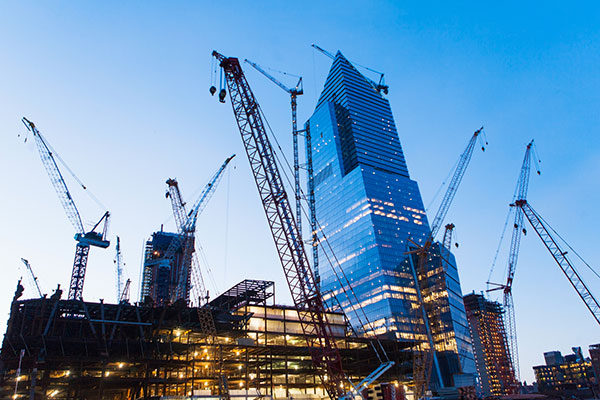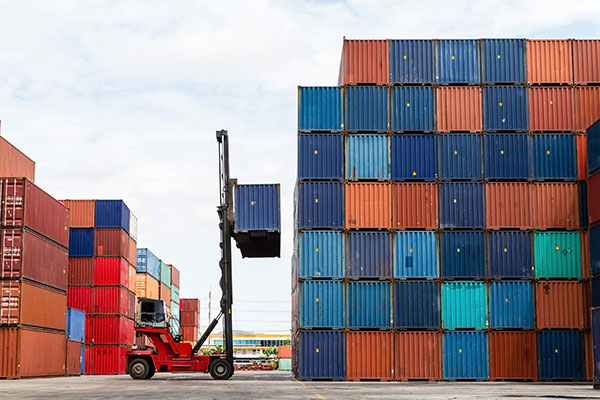For companies with a stake in some of the world’s most carbon-intensive and resource-dependent industries, October 2023 is a call to action.
By Juliana Bruwer & Thijs Elling
This was the month that could well usher in a new era of reckoning — and opportunity — in industries like construction, mining and mill products and building materials as a result of several new climate accountability policies. Each of these policies will profoundly impact companies in these industries at the operational, financial, and strategic levels, if not immediately, then in the near future.

The reckoning comes in the form of a new wave of regulations in multiple jurisdictions. Among them is the European Union’s CBAM (carbon border adjustment mechanism), a tariff on the imports of certain materials and goods, based on the greenhouse gases (GHG) emitted to manufacture them. CBAM applies to imports of goods and materials deemed at highest risk of carbon leakage, a term that refers to manufacturers shifting production to places where emissions regulations are more lenient. As of this October 1, companies that import cement, iron and steel, aluminum, fertilizers, electricity, and hydrogen into the EU must report GHGs embedded in their imports. Importantly, that could include emissions from manufacturing facilities outside the EU, which are traditionally considered Scope 3 for the importer. Importers won’t be required to pay emission-based tariffs until 2026, when CBAM becomes fully effective. By then, the regulation will likely also apply to a broader range of products, including plastics.
With CBAM, the EU is sending a clear message to two categories of companies. It’s telling those that import emission-intensive products into the region that they’ll be held accountable for reporting on the carbon emissions associated with those products, and for paying any tariff they owe. And it’s telling those that extract or make carbon-intensive products destined for the EU market that they’ll be held accountable for accurately tracking and reporting on the greenhouse gas emissions associated with those exports.
Similar messages are emanating from regulators in the U.S., where the Security and Exchange Commission (SEC) is moving toward finalizing rules that would require corporations to publicly disclose information about how they manage climate-related risks, and about the greenhouse gas emissions they produce. Some U.S. companies soon may also have to report on multiple ESG requirements, including compliance with EU rules. While it was unclear as of this writing whether the SEC would require companies to disclose direct and indirect emissions (the agency was due to finalize the rules in October), there’s no such uncertainty in new rules expected to become law in California sometime in October. They will require large public and private companies that do business in the state to disclose GHG emissions starting in 2026 for Scope 1 and 2 emissions, and in 2027 for Scope 3 emissions, according to a fact sheet from the Cooley law firm.

“Because companies subject to the bill will be required to report their Scope 3 value chain emissions,” Cooley said, “we expect to see an increase in emissions data requests from large companies to their suppliers and vendors. As a result, many companies with revenues well below $1 billion that are not directly subject to reporting obligations should expect to come under additional pressure from their customers and vendors to calculate and produce GHG emissions data.”
These policies present companies that are part of many industrial value chains with a choice. They can treat the new regulations — and similar policies that are likely to follow — as a burden and drag their feet, or they can view them as a chance to turn the world’s growing preference for lower-carbon products and companies into a competitive edge.
For early movers in the latter category, there’s the opportunity to gain purchasing leverage and pricing advantages over slower-moving and less-prepared competitors, for example, by parsing suppliers and aligning with those whose products or materials have the most favorable GHG and cost profiles. Aligning with suppliers that have a relatively low-emitting GHG profile and a firm handle on their ESG data will become more appealing. Mobilizing early also gives companies more time to sort through the complexities involved with Scope 3 emissions, and to test systems and processes for reporting.
Here are several steps we see as necessary to accessing these early-mover benefits and making the most of the opportunities the era of corporate environmental responsibility brings:
Making granular GHG accounting integral to operational and supply chain decision-making. As the link between sustainability and profitability for businesses continues to strengthen, we’re seeing more companies embed environmental factors into their decision-making across the organization. Basically, they’re bringing emissions data on a transactional level into their operational and supply chain decision-making alongside factors related to financial and goods flows.
Strengthening the ability to gather accurate primary data and share it with supply chain partners and regulators. With requirements to track Scope 3 emissions part of CBAM, California’s new policies and potentially, the SEC’s forthcoming regulations, and with other jurisdictions pursuing similar requirements, there’s increasing urgency for companies that are part of industrial value chains to develop capabilities to collect, calculate and share actual emissions values, by product/material, by specific production site, within their own operations, and across entire value chains. Basically, they will need the means to securely exchange Scope 3 GHG data across companies in such a way that it can be automated and scaled.
Managing carbon certificates and customs declarations. The CBAM tariff system is based on certificates that can be bought and sold under the EU’s Emissions Trading Scheme. Companies that are exporting or importing products subject to CBAM must have capabilities to manage the GHG emissions and financial accounting responsibilities associated with these certificates. They also will need capabilities to manage the documentation and processes associated with customs declarations.
By taking these steps, companies should be well-positioned to stay ahead of the regulatory curve and capitalize on the opportunities that carbon responsibility policies are creating.

Juliana Bruwer is a senior solution specialist within SAP’s global industry business unit for mining, with a focus on sustainability. Over the past 25 years, she has consulted with a range of SAP customers in multiple industries, including mining, metals, utilities, and oil & gas. Her prior professional background is as principal pyrometallurgist in the base metal and platinum industry.

Thijs Elling is part of SAP’s new business & industry strategy team, working on projects with a strategic impact on SAP and the broader ecosystem of customers and partners. He specializes in issues related to climate action, and currently leads programs related to EU-CBAM at SAP.
Visit www.sap.com/industries
For more about GHG reporting requirements and the capabilities companies across the industrial landscape will need in order to meet them, check out this GreenBiz webcast on October 12.
Scott Ellyson, CEO of East West Manufacturing, brings decades of global manufacturing and supply chain leadership to the conversation. In this episode, he shares practical insights on scaling operations, navigating complexity, and building resilient manufacturing networks in an increasingly connected world.